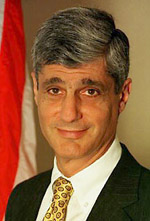Robert Rubin to join Harvard Corporation

Robert E. Rubin ’60 will become the newest member of the Harvard Corporation, the University announced today.
Rubin, former U.S. Secretary of the Treasury and the principal speaker at Harvard Commencement last June, will assume his role as a Fellow of Harvard College on July 1, 2002.
The election of Rubin by the Corporation, with the consent of the Board of Overseers, marks the conclusion of a search launched after Robert G. Stone, Jr., announced in December his plans to step down at the end of June.
“Robert Rubin is one of the most accomplished and admired Harvard alumni of his generation,” said James R. Houghton, a member of the Corporation and chair of the search committee. “He is a person of superb judgment and wide-ranging experience, and I’m very pleased that he has agreed to serve Harvard in this important role.”
“Obviously, Bob Rubin is someone for whom I have the deepest respect,” said President Lawrence H. Summers, who served as Rubin’s Deputy Secretary in the Treasury Department from 1995 to 1999. “I know from experience that his wisdom and judgment, as well as his understanding of how complex organizations work, will serve the University extremely well.”
“Harvard is a great university — a true global resource — that plays an enormous role in furthering inquiry, understanding, and debate across the entire spectrum of intellectual pursuits,” Rubin said. “I am pleased to have the opportunity to contribute to that important mission, and to work with Larry Summers and his colleagues on the Corporation and in the Harvard community in thinking about Harvard’s future opportunities, directions, and challenges.”
Born in New York City in 1938, Rubin received a bachelor’s degree from Harvard in 1960, graduating summa cum laude in economics. He did graduate work at the London School of Economics, then attended Yale Law School, from which he received the LL.B. degree in 1964.
In 1966, after a brief stint in legal practice, Rubin joined Goldman, Sachs & Co., one of the world’s leading investment firms. His decades-long career at the firm culminated in his appointment as Vice-Chairman and Co-Chief Operating Officer from 1987 to 1990, then as Co-Senior Partner and Co-Chairman from 1990 to 1992.
In 1993, Rubin left Wall Street for Washington to serve as Assistant to the President for Economic Policy and, in that capacity, to head the National Economic Council. Two years later, in January 1995, he was named Secretary of the Treasury, and in that role functioned as senior economic adviser to the president and chief financial officer of the U.S. government.
Rubin is widely regarded as having been one of the most effective Treasury Secretaries in the nation’s history. His years in government were characterized by the longest domestic peacetime expansion in U.S. history, low inflation, low unemployment, and a stock market that rose to record levels. On the international front, he worked to strengthen the dollar and to defuse financial crises in Mexico and Asia, carefully navigating the U.S. economy through a period of transformative global change.
After stepping down as Treasury Secretary in 1999, Mr. Rubin joined Citigroup, the international financial services firm, where he serves as Chairman of the Executive Committee and Member of the Office of the Chairman. In addition, he chairs the board of the community development organization known as the Local Initiatives Support Corporation, a reflection of his long-standing concern for the renewal of distressed urban areas. He is also a trustee of Mount Sinai-NYU Health.
Rubin’s activities before becoming Treasury Secretary included membership on the boards of directors of the New York Stock Exchange, Harvard Management Company, the New York Futures Exchange, the New York City Partnership, and the Center for National Policy. He also served on the board of trustees of the Carnegie Corporation of New York, among other organizations.
Rubin received an honorary doctoral degree from Harvard in June 2001, when he delivered the principal Commencement address. His speech, available at http://www.commencement.harvard.edu/rubin.html, reflected on the nature of complex decision making in a world characterized by probabilities and uncertainties, and on the value of careers in public service.
In announcing Rubin’s selection as Commencement speaker, then-President Neil L. Rudenstine said: “Bob Rubin has been a rare public servant, someone who has worked in a quiet, understated, yet supremely effective way to make one of the world’s most complicated and important jobs seem almost easy. He brought a combination of extraordinary intellect, experience, and judgment to the task of guiding the development of a genuinely global economy during a critical period in world affairs. He is a person of eloquence and remarkable insight, and he cares deeply about how economics and public policy affect the lives of people around the globe.”
The Harvard Corporation, formally known as the President and Fellows of Harvard College, is Harvard’s executive governing board and the smaller of Harvard’s two boards, the other being the 30-member Board of Overseers.




